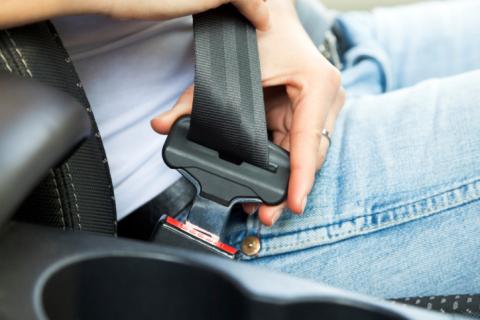
In May, Utah’s new seat belt law went into effect, making it a primary offense to not wear a safety belt. Police can now pull you over and give you a ticket just for not wearing your seatbelt. Before, an officer had to pull you over for another reason, such as speeding or not stopping at a red light then add on the ticket for not buckling up.
Representative Lee Perry, RPerry, who also works as a lieutenant with the Utah Highway Patrol, sponsored HB79 during the 2015 legislative session. He was approached by the parents of Amanda Brown, a teen that died in a rollover accident, along with her friend, Tyler Stewart—neither had been wearing a seatbelt.
While the teens had both been taught by their parents about the importance of wearing seatbelts, the teens’ parents believe having a primary seatbelt law would have given more incentive for them to wear them and possibly would have saved their lives.
“Driving is a privilege,” Perry stated during the Senate Business and Labor Committee hearing. “People who choose to not wear seat belts become projectiles and hurt other people in other cars, but they also have a huge economic deterrent on our community.”
Perry explained that Utah taxpayers spend millions of dollars in hospital and emergency costs, money that would be reduced with the new law.
The Utah Transportation Coalition’s website explains that research shows 50 percent of traffic fatalities, over the last five years in Utah, could have had a different outcome had the individuals worn seatbelts. Additionally, seatbelt use is 12 percent higher in states with primary seat belt laws.
HB79 has seen a lot of opposition in its drive to become law. It passed the Utah House of Representatives with a 4132 vote, but only 17 senators voted to have it pass.
During the Senate committee hearing, Cindy O’Neall spoke against the law being enacted. “I cherish that I am an adult in a free country and that I have the right to choose,” O’Neall stated. “I think legislatures should take great pause on legislating personal freedoms. Laws should not criminalize my freedom.”
O’Neall told representatives that she lost a son to a gunshot wound five years earlier. As difficult as it has been, she would never speak out against 2nd Amendment laws. “I cherish that I am an adult in a free country and that I have the right to choose.” She went on to emphasis that the US Constitution does not allow representatives to legislate rights. “I don’t think [the Constitution] gets the recognition anymore that it needs.”
Josh Daniels, from the Libertas Institute and Dan Duel, former House District 7 candidate, also noted the new bill goes against the Constitution and individual’s right to choose.
This Bill has a sunset date, meaning in three years legislatures will look at whether or not this law does indeed decrease the number of fatalities on Utah’s road, and decide to continue keeping the law. Both the Utah Highway Patrol and UDOT have committed to keep track of the data to present to legislatures then.